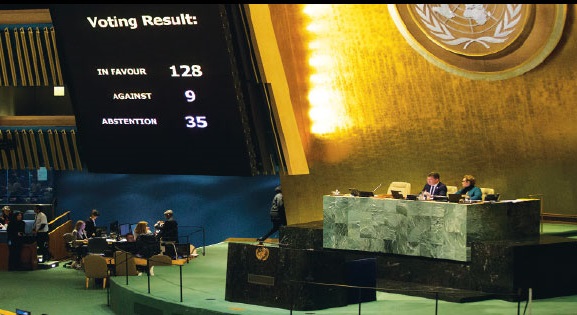Target Practice at the UN

Condemned by a UN majority, Haley still finds ground to build on

At first glance, the UN vote seemed like the same old, same old. What could be new about yet another grossly disproportionate UN resolution negatively focusing on Israel? In this respect, last week’s UN resolution to condemn the US recognition of Jerusalem as Israel’s capital appeared to be the same old script.
But there was an essential, crucial difference.
All the previous denunciations and condemnations targeted Israel, and in response, the US for the most part supported its Mideast ally. This time, however, the target was the Trump administration and its policies, along with American sovereignty. As far as President Trump and US Ambassador to the UN Nikki Haley were concerned, the vote didn’t concern the Israel-Jerusalem connection so much as the American people’s right to decide where to position its embassy.
That fine but important difference put America on the defensive, dictating a completely different modus operandi. Prior to the actual vote, the US made direct threats to withhold aid money from countries that voted in favor of the resolution. What’s more, I learned from an Israeli diplomat that the American delegation asked the Israelis to lobby specific African countries with healthy Israeli ties — illustrating how the US fought for every vote.
Trump, who canceled all other engagements that day, surely wasn’t pleased by all the green “yes” votes filling up the huge panels in the main hall, even if he’d known in advance that the condemnation would go through. Nevertheless, the results were slightly heartening: 128 countries supported the resolution, fewer than the 138 that voted in favor of giving the Palestinian Authority observer status at the UN, and significantly fewer than the 176 that just two weeks ago supported granting the Palestinians the right to self-determination. In addition, 21 states disappeared from the main hall. Among the abstentions were six EU states: Poland, the Czech Republic, Hungary, Croatia, Latvia, and Romania.
After the vote, Nikki Haley gave out invitations to a reception for all the 65 countries that had voted no, or who were absent or abstained. The message is crystal clear: The UN defeat notwithstanding, there exists a substantial bloc that did not defy Trump’s announcement — and that’s something to build on.
What remains to be seen, as of this writing, is how Trump will make good on his threats to punish those who condemned his Jerusalem declaration. Practically speaking, it’s unclear how he can institute any sort of collective punishment. Cutting aid to countries like Jordan or Egypt is not an option, because there are too many interests that outweigh the insult at the UN. Then again, singling out specific countries is also problematic; by withdrawing its influence, the US effectively creates a vacuum that China will be all too happy to fill.
“I have some beautiful pens over here, and… I think I’m probably going to hand some of them to the press. Many of you have worked very hard, many of you have worked very, very fairly, and we really appreciate that. I particularly like the boom holders and the cameramen.”
—President Donald Trump, last Friday morning at a hastily convened session to sign the tax reform bill into law. As a rule, the president holds a formal signing ceremony, after which he presents the pens used for signing the law to the politicians or civil servants who were especially active in promoting that specific law. Given the absence of guests due to the short notice, the president gave the pens used for signing the law to the journalists who were present.
(Excerpted from Mishpacha, Issue 691)
Oops! We could not locate your form.













